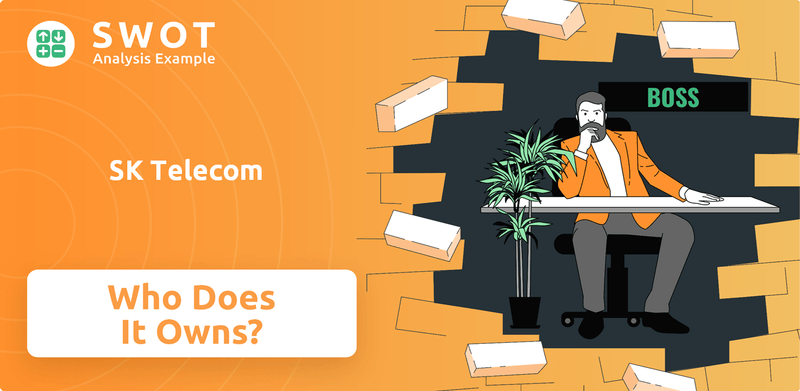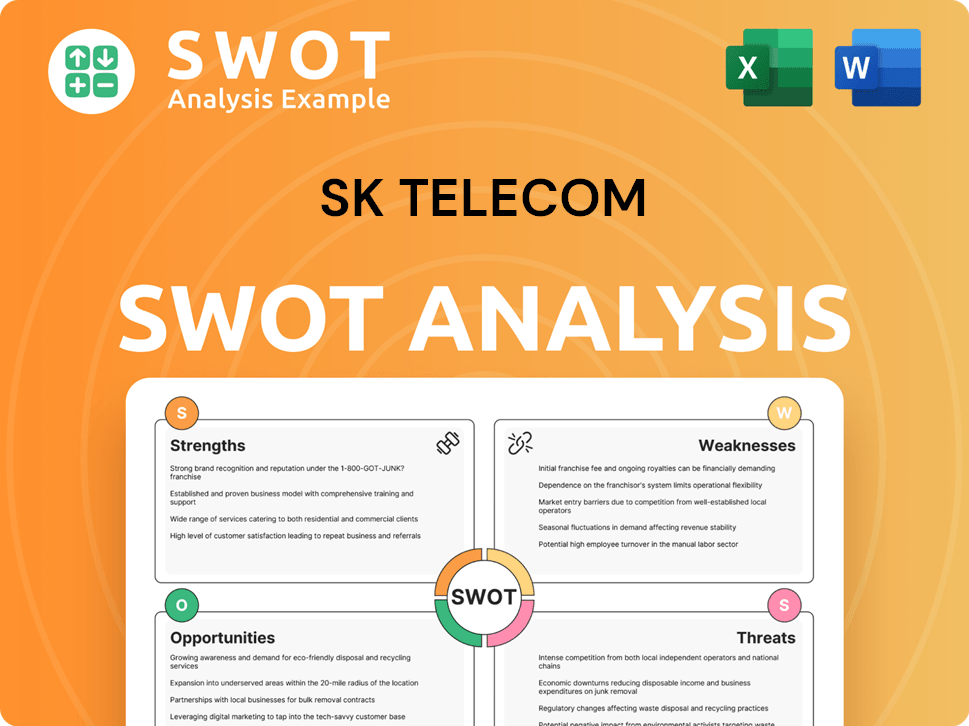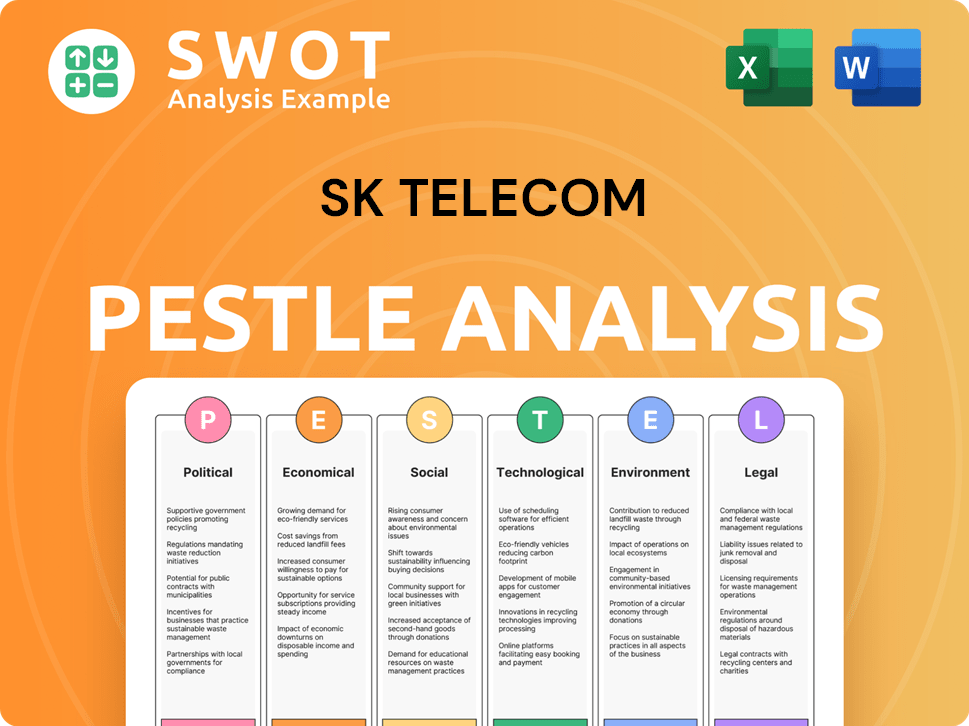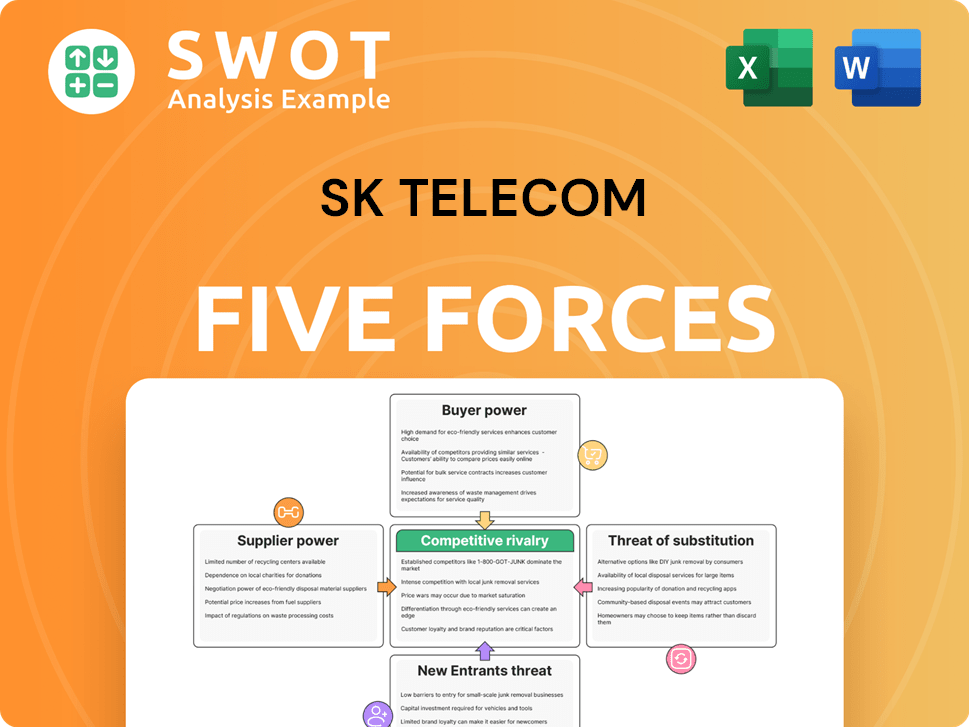SK Telecom Bundle
Who Really Owns SK Telecom?
Unraveling the ownership of SK Telecom, a powerhouse in the Korean telecom sector, is key to understanding its strategic moves and market dominance. Founded in 1984, this mobile carrier has evolved into a leader, shaping the nation's communication landscape. Understanding SK Telecom SWOT Analysis can further illuminate its position.

This exploration into SK Telecom ownership will reveal the influence of the SK Group, its major shareholders, and the impact on its future. Discover how this Korean telecom giant's corporate structure, including its subsidiaries and leadership, affects its financial performance and market share. We'll delve into the details of who controls SK Telecom and how the company's ownership has evolved.
Who Founded SK Telecom?
The story of SK Telecom begins in 1984, originally established as Korea Mobile Telecommunications Services. Initially, it operated as a public enterprise, meaning it wasn't founded by individual entrepreneurs in the traditional sense. Instead, its early ownership was primarily governmental, reflecting its status as a state-owned entity.
The pivotal shift in SK Telecom ownership came in 1994. The company was acquired by the SK Group (then known as Sunkyong Group) as part of a government privatization initiative. This transition moved the company from state control to private corporate ownership, marking a significant change in its structure.
The details of the equity split and shareholding at the time of the acquisition were determined by the privatization deal between the South Korean government and the SK Group. Early backers or angel investors, as typically understood, weren't applicable due to its origins. The SK Group's acquisition effectively represented the initial private investment that shaped its early ownership structure.
The company began as a state-owned entity, Korea Mobile Telecommunications Services, in 1984.
Privatization occurred in 1994 when the SK Group acquired the company.
The acquisition by SK Group marked a shift from government to private ownership.
The SK Group's acquisition represented the initial private investment.
The SK Group's vision aimed to expand its telecommunications footprint and integrate it within the conglomerate's business portfolio. The SK Group is the parent company of SK Telecom. As of 2024, SK Group holds a significant stake, reflecting its control over the company. The specifics of the early agreements, such as vesting schedules or buy-sell clauses, aren't publicly available due to the nature of the privatization process. Any initial ownership disputes likely revolved around the privatization itself rather than internal founder disagreements. The company's history shows a clear transition from state control to private ownership under the SK Group.
- The initial ownership was governmental.
- Privatization led to the acquisition by the SK Group.
- The SK Group's acquisition was the initial private investment.
- Details of early agreements aren't publicly accessible.
SK Telecom SWOT Analysis
- Complete SWOT Breakdown
- Fully Customizable
- Editable in Excel & Word
- Professional Formatting
- Investor-Ready Format

How Has SK Telecom’s Ownership Changed Over Time?
The evolution of SK Telecom's ownership is a story of privatization and strategic acquisitions. Initially, the company was a government-owned entity. The pivotal moment was its acquisition by the SK Group in 1994, followed by an initial public offering (IPO). This IPO opened the door for public shareholding, transforming the ownership landscape and introducing a mix of institutional and individual investors.
The IPO's timing and initial market capitalization details require historical financial data, but the impact is clear: SK Telecom has been a publicly traded entity for many years, listed on the Korea Exchange. This transition diversified the shareholder base, bringing in institutional investors, mutual funds, and individual investors alongside the primary corporate parent, the SK Group. This shift marked a significant change in the company's governance and strategic direction.
| Event | Impact on Ownership | Year |
|---|---|---|
| Privatization | Transition from government ownership to private ownership. | Early 1990s |
| Acquisition by SK Group | SK Group becomes the controlling shareholder. | 1994 |
| Initial Public Offering (IPO) | Public offering of shares, broadening the shareholder base. | Specific date varies, but post-1994 |
As of early 2025, the SK Group, specifically SK Inc., remains the dominant major stakeholder in SK Telecom. SK Inc. holds a substantial ownership stake, typically exceeding 20%. As of December 31, 2023, SK Inc. held 26.8% of SK Telecom's shares, granting significant influence over the company's strategic decisions. Other major shareholders include various institutional investors, both domestic and international, holding considerable portions of the publicly traded shares. Individual insider holdings are comparatively smaller. This ownership structure directly impacts the company's strategic focus, including its emphasis on new growth areas like AI and fixed-line broadband, aligning with the SK Group's broader objectives.
The SK Group, through SK Inc., is the primary owner of SK Telecom. This ownership structure influences strategic decisions and corporate governance.
- SK Inc. held 26.8% of shares as of December 31, 2023.
- Institutional investors hold a significant portion of the publicly traded shares.
- The ownership structure aligns with the strategic goals of the SK Group.
- SK Telecom is a publicly traded company listed on the Korea Exchange.
SK Telecom PESTLE Analysis
- Covers All 6 PESTLE Categories
- No Research Needed – Save Hours of Work
- Built by Experts, Trusted by Consultants
- Instant Download, Ready to Use
- 100% Editable, Fully Customizable

Who Sits on SK Telecom’s Board?
The current board of directors of SK Telecom includes a blend of representatives from its major shareholder, SK Inc., and independent directors. This composition is vital for understanding the company's governance and decision-making processes. The board typically comprises executives from SK Telecom, representatives from SK Inc., and independent directors who provide oversight and ensure sound corporate governance. To find the specific names and affiliations, one would need to consult the most recent public annual reports or corporate governance filings.
The board's structure is designed to ensure a balance of interests, with independent directors playing a crucial role in maintaining transparency and accountability. The presence of SK Inc. representatives reflects the parent company's significant influence over SK Telecom's strategic direction. The independent directors bring an objective perspective, helping to safeguard the interests of all shareholders. This structure is typical of large corporations, aiming to balance stakeholder interests effectively.
| Board Role | Representation | Primary Function |
|---|---|---|
| Executives | From SK Telecom | Operational Management |
| Representatives | From SK Inc. | Strategic Oversight |
| Independent Directors | Various backgrounds | Governance and Oversight |
SK Telecom's voting structure generally follows a one-share-one-vote principle. However, SK Inc.'s substantial ownership stake grants it significant control. As of late 2023, SK Inc. held approximately 26.8% of the shares, providing considerable voting power in shareholder meetings. This allows SK Inc. to influence director elections and major corporate actions. There is no publicly available information about dual-class shares or special voting rights that would give outsized control to specific entities beyond their proportional shareholding. The company's governance is largely stable under the influence of SK Inc.
SK Telecom's board of directors includes representatives from SK Inc. and independent directors, ensuring a balance of interests. SK Inc.'s significant ownership gives it considerable influence over the company's decisions.
- SK Inc. holds approximately 26.8% of SK Telecom's shares.
- Independent directors provide oversight and ensure good corporate governance.
- The voting structure generally follows a one-share-one-vote principle.
- There are no recent high-profile controversies that have reshaped decision-making.
SK Telecom Business Model Canvas
- Complete 9-Block Business Model Canvas
- Effortlessly Communicate Your Business Strategy
- Investor-Ready BMC Format
- 100% Editable and Customizable
- Clear and Structured Layout

What Recent Changes Have Shaped SK Telecom’s Ownership Landscape?
Over the past few years (2022-2025), several developments have shaped the ownership landscape of SK Telecom. A significant move was the spin-off of SK Square in November 2021, which housed the company's semiconductor and ICT investments. This strategic decision allowed SK Telecom to concentrate on its core telecommunications business, altering the asset composition within the SK Group and influencing the investment rationale for shareholders in both entities. This restructuring aimed to unlock value and streamline operations.
Industry trends have also played a role in influencing SK Telecom ownership. Increased institutional ownership and a focus on ESG (Environmental, Social, and Governance) factors are becoming increasingly important. Institutional investors are carefully examining corporate governance and sustainability practices, which indirectly affect investment choices and ownership structures. SK Telecom's push into new growth areas, such as AI and fixed-line broadband services, is designed to boost future value and attract investors interested in these emerging technology sectors. The company's ongoing efforts to enhance shareholder value will continue to shape its ownership landscape in the coming years. For more information about the company's target market, you can read about the Target Market of SK Telecom.
As a key subsidiary, SK Telecom's ownership is largely influenced by its parent company, SK Group. SK Group's strategic decisions and financial performance directly impact SK Telecom's operations and future direction. Understanding the relationship between SK Telecom and SK Group is crucial for assessing the company's ownership dynamics and strategic alignment. The structure ensures a cohesive approach to investments and business development.
SK Telecom is actively pursuing strategies to enhance shareholder value. This includes strategic investments in growth areas like AI and broadband services. The company's focus on innovation and expansion into new technologies is designed to attract investors and improve financial performance. These initiatives reflect a commitment to long-term growth and shareholder returns, influencing the company's ownership profile.
SK Telecom Porter's Five Forces Analysis
- Covers All 5 Competitive Forces in Detail
- Structured for Consultants, Students, and Founders
- 100% Editable in Microsoft Word & Excel
- Instant Digital Download – Use Immediately
- Compatible with Mac & PC – Fully Unlocked

Related Blogs
- What are Mission Vision & Core Values of SK Telecom Company?
- What is Competitive Landscape of SK Telecom Company?
- What is Growth Strategy and Future Prospects of SK Telecom Company?
- How Does SK Telecom Company Work?
- What is Sales and Marketing Strategy of SK Telecom Company?
- What is Brief History of SK Telecom Company?
- What is Customer Demographics and Target Market of SK Telecom Company?
Disclaimer
All information, articles, and product details provided on this website are for general informational and educational purposes only. We do not claim any ownership over, nor do we intend to infringe upon, any trademarks, copyrights, logos, brand names, or other intellectual property mentioned or depicted on this site. Such intellectual property remains the property of its respective owners, and any references here are made solely for identification or informational purposes, without implying any affiliation, endorsement, or partnership.
We make no representations or warranties, express or implied, regarding the accuracy, completeness, or suitability of any content or products presented. Nothing on this website should be construed as legal, tax, investment, financial, medical, or other professional advice. In addition, no part of this site—including articles or product references—constitutes a solicitation, recommendation, endorsement, advertisement, or offer to buy or sell any securities, franchises, or other financial instruments, particularly in jurisdictions where such activity would be unlawful.
All content is of a general nature and may not address the specific circumstances of any individual or entity. It is not a substitute for professional advice or services. Any actions you take based on the information provided here are strictly at your own risk. You accept full responsibility for any decisions or outcomes arising from your use of this website and agree to release us from any liability in connection with your use of, or reliance upon, the content or products found herein.